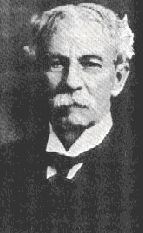This month Augustus Hopkins Strong (3 August 1836 – 29 November 1921) is ordained as the pastor of the First Baptist Church of Haverhill, Massachusetts. Fresh from earning his doctorate in theology, Strong begins a ministerial journey that will lead him to a place of national prominence and esteem in Baptist life as the foremost American Baptist theologian of the late 19th and early 20th centuries.
Strong’s father Alvah helped found Rochester Baptist Theological Seminary, and Strong is a 1857 Yale graduate. Converting to Christianity while at Yale, Strong began his theological studies at Rochester and finished his D. D. in Germany before assuming the pastor of the Haverhill congregation. He pastors FBC Haverhill throughout the war years, then assumes the pastorate of First Baptist Church of Cleveland, Ohio. In 1872, Strong is elected president or Rochester Theological Seminary, where he remains for forty years. In 1907-1910, he also serves as the president of the Northern Baptist Convention (now American Baptist Churches, U.S.A.).
In 1886, Strong publishes his Systematic Theology, a volume that becomes one of the most influential theological works of the late 19th century. In the years following, he establishes himself as a centrist orthodox, Reformed theologian who rejects the inerrantist rigidity of Charles Hodges yet holds Christ as the only “revealer” of God. Opposing the newly-arisen fundamentalist movement and its reaction against modern science, Strong embraces higher biblical criticism and evolution as part of “Christ’s creating and educating process.”
Strong’s career parallels major cross-currents in Baptist history in the post-war era and early twentieth century, including the waning of Reformed theology and the beginnings and maturation of fundamentalism. The ascendancy of the fundamentalist movement is enabled to a significant degree by the Civil War’s legacy of pessimism in terms of the human condition, resulting in the waning of popular post-millennial views of Christ’s return and the growth of pre-millennialism, an eschatological view predicated upon an escalation of human evil on earth before Christ’s return.
As a centrist, Strong retains the respect of many Baptists across the theological spectrum, other than fundamentalists (who strongly reject evolution and higher biblical criticism). Nonetheless, the currents of modernism make further inroads upon Strong’s theological convictions during the latter years of his life.
Sources: Strong brief biography (link) and (link); Strong’s Systematic Theology (link); see also Grant Wacker, Augustus H. Strong: And the Dilemma of Historical Consciousness (Macon, Ga.: Mercer University Press, 1985, 2005).



